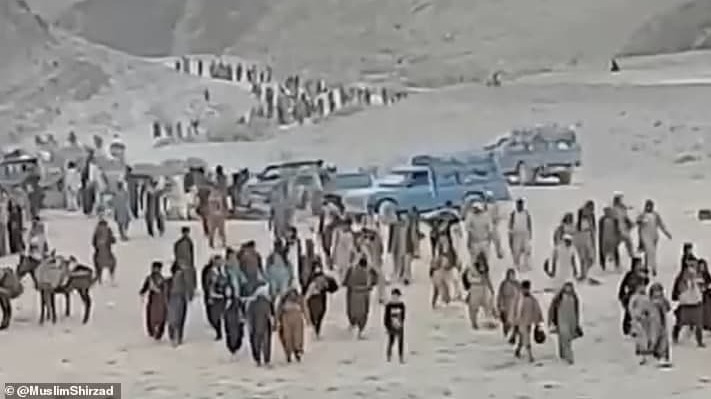Getting your Trinity Audio player ready...
Since the fall of Kabul to the Taliban, life in the Afghan capital has become a challenge for many. Among those experiencing the difficulties of the takeover are many Pashtun, the country's largest ethnic group consisting of more than 15 million people.
While the Taliban themselves began as a Pashtun tribal movement, and still holds great power in the Pashtun’s cultural heartland in Afghanistan’s south today, not all members of the ethnicity sympathize with the country's new rulers.
Many of them have served in the Afghan National Army, and the last two Afghan presidents were Pashtun themselves.
Some among the Pashtun believe the historic theories that suggest that the Pashtuns are decedents to the lost tribes of the Israelites, and even feel a connection to the Jewish state, Judaism and the theories about their Israelite origins.
Israeli anthropologist Prof. Avigdor Shachan suggests that the lost tribes of Israel settled in Afghanistan after the Assyrian conquest of the land of Israel in 856–732 BCE.
He points to clues in the names of some Afghan cities he claims may have come from the Hebrew language and culture, such as Kandahar, which he says is similar to the word "har," which is Hebrew for "mountain." Others point to similarities between Pashtun and Jewish names.
One such Afghan Pashtun who claims to feel a strong connection to Israel is H. a former official who asked to remain anonymous.
"I'm a prime target for the Taliban," he said. "If they'll know I'm in Kabul, they'll behead me."
H. worked with former Afghan president Ashraf Ghani but has not had any contact with him since the ousted leader fled the country.
"The Taliban killed and wounded dozens of people… they took down our national flag."
In 2019, H. contacted Israeli scholar Prof. Hillel Weiss, a self-proclaimed spokesperson for the Sanhedrin — assemblies of elders appointed to sit as a tribunal in the ancient Land of Israel. Weiss calls for the rebuilding of the Jewish Temple in Jerusalem and instating Jewish rule over Greater Israel. The two even met in India and exchanged thoughts about future cooperation.
"I wrote to officials such as Defense Minister Benny Gantz and to journalists about this," Weiss says. "We need to help them. This is their land, and they will return to their original place. They don’t even have to convert to Judaism. But they have to accept the Seven Laws of Noah," he says, referring to a traditional set of laws that allows non-Jews to live under Jewish rule without converting.
In a past interview, Weiss said that after his encounter with H., he received a call from an Afghan official who was interested to promote financial and cultural cooperation with Israel.
H. doesn’t dismiss the possibility of leaving his country for Israel. "If I had a visa, I would have moved to Israel," he says. "But not as an asylum seeker." He also said he would not convert to Judaism, although he does feel a strong connection to Israel and to the Jewish people.
"We both have the same blood. We are Bnei Israel," he says, using a Hebrew term meaning "Sons of Israel" or "Israelites."
Another Pashtun Afghan who asked not to be identified is S., who now lives in Peshawar, Pakistan. Originally from Afghanistan, S. has lived in different cities around the world and worked in the shipping industry. His Facebook page features Jewish symbols.
"Israel is my country," he says. "I am persecuted here because of my Jewish faith. I would like to contact the Israeli authorities and start an immigration process."
Since the Taliban takeover of Afghanistan, the possibility of allowing Afghan refugees into Israel made some headlines when a lawmaker from the left-wing Meretz party, Gabi Lasky, advocated for the government to offer sanctuary to people fleeing Taliban rule.
Lasky had not specifically referred to the Pashtuns and their possible historical roots and says she knew nothing about that. "I thought we should take in a few hundred asylum seekers," she says. "The Jewish people have suffered from persecutions and were refugees more than anyone else. So we can't turn a blind eye to their suffering."
4 View gallery


Afghans attempting to flee the country through the border with Pakistan earlier this week
Lasky's initiative is unlikely to bear fruit, considering Israel's strict immigration laws.
The future is unclear for the Pashtun people, especially for those who supported the previous regime.
"There is no way I'm staying in Afghanistan," H. says, adding that he is considering moving to Australia or Canada.
But this crisis may offer a turning point Afghan-Israeli ties — two nations that do not share borders but may have more in common than many think.




